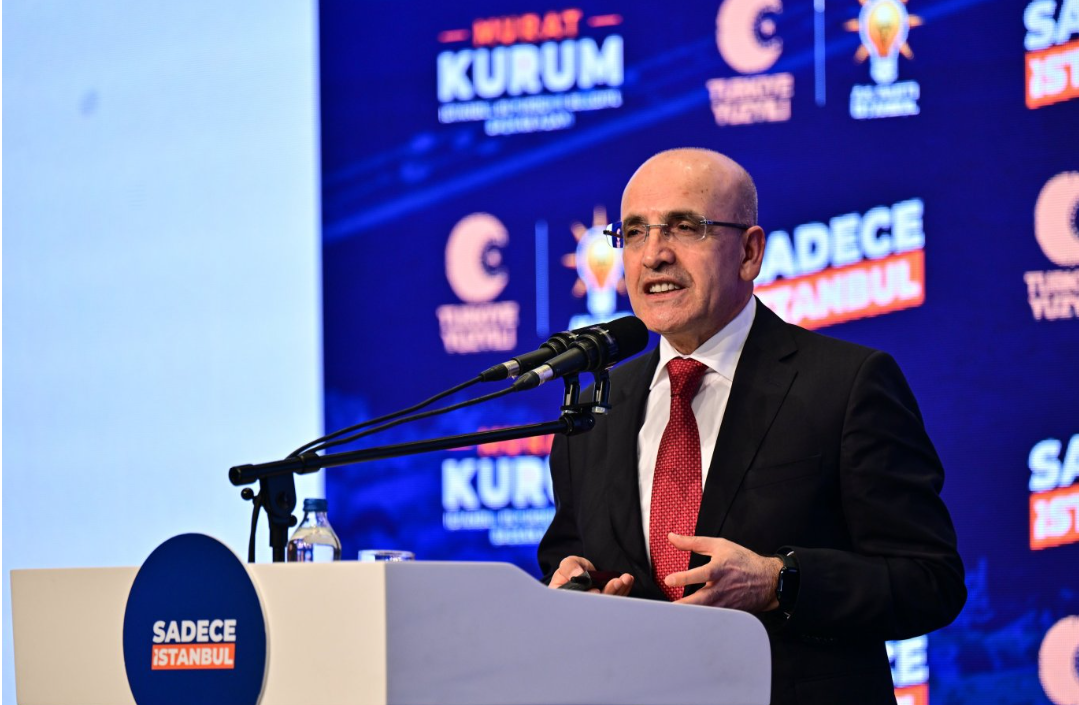Treasury and Finance Minister Mehmet Şimşek appeared on financial TV broadcaster BloombergHT’ s morning news program on Monday and said Türkiye’s economy program “is working”. He added that current set of policies was supportive of the Turkish lira, dismissing scenarios for a steep depreciation after the local elections later this month, a scenario much discussed in social media space.
Other highlights form the interview are:
There won’t be across-the-board increases in tax rates such as in income tax, corporation tax or value-added tax.
The current-account deficit will narrow to between $30 billion and $35 billion as of February/March.
Turkey aims to increase its reserves at least to the level of short-term external debt.
What did Mehmet Simsek say about post-election economic policy?
“The policy set we are implementing now is making the lira attractive,” Şimşek told an interview with private broadcaster Bloomberg HT.
The currency has weakened by about 6% this year after a nearly 37% drop in 2023. It was slightly weaker at 31.4205 against the dollar after official data showed Türkiye’s annual inflation climbed to 67.07% in February.
Though some analysts predict currency weakness after the elections – in which President Recep Tayyip Erdoğan’s ruling party seeks to reclaim big cities from the opposition – Şimşek said authorities want neither a depreciating nor very valuable lira.
“We want the lira to be neither overvalued nor undervalued,” he said.
Inflation to be ‘back on trend’
Led by Şimşek, the new economy administration has delivered aggressive tightening aimed at arresting inflation, curbing chronic deficits, rebuilding foreign exchange reserves and stabilizing the lira.
The essence of the government’s medium-term program, unveiled in September, “is to bring inflation down to single digits,” Şimşek said. “Currently, we are far from price stability, but that is our target.”
Shortly before the data on Monday, the minister said annual inflation would remain high in the coming months due to base effects and the delayed impact of rate hikes but would fall in the next 12 months.
Şimşek stressed monthly inflation would be “back on trend as of March.”
Gradual exit from FX-protected scheme
The government has unveiled measures to phase out a foreign exchange-protected deposit scheme, known as KKM, which Şimşek says hampers the government in achieving its goals.
The scheme was introduced in late December 2021 to help reverse dollarization and support the lira.
“We aim for a gradual exit without disrupting markets,” the minister said.
KKM’s size has been continuously decreasing for 27 weeks, which Şimşek says demonstrates that the scheme is losing its appeal, adding that the majority of the outflows from the program shifted to lira deposits.
“I think the attractiveness of KKM will naturally decrease … I am comfortable about that. We will achieve the exit from KKM,” said the official.
Şimşek said the government’s program “is working” even “stronger in some areas than we anticipated.
“It is important for market actors to believe in the program. I believe this is summarized in risk premiums. This situation has made it much more favorable for Türkiye to access external resources,” he noted.
“Since August, Türkiye has had the opportunity to access international finance at lower spreads.”
No FX rate target
The confidence dimension of the program has worked very well and Türkiye will see a significant inflow of foreign funds after the elections that are slated for March 31, said the minister.
He stressed that the falling current account deficit, maintenance of fiscal discipline and removal of election uncertainty would also support the lira. He added that the government does not have a foreign exchange rate target.
“Expectations of a depreciation of the lira after the elections do not seem meaningful. The current account deficit is decreasing. We also need less foreign currency,” said Şimşek. “We do not have a target for the exchange rate, nor will we.”
“In an environment where the uncertainty of the election is removed, why would the Turkish lira depreciate more than inflation?” said Şimşek.
“When our program is successfully implemented, there will be no real depreciation in the Turkish lira. In successful disinflation programs, the local currency appreciates in real terms.”
Tax hikes not in plans
He estimated that the current account deficit would likely drop to between $30 billion (TL 94.58 billion) and $35 billion in February and March.
“The current account deficit is dramatically narrowing because the program is changing. We have changed the composition of growth,” he noted.
Türkiye ended 2023 with a gap of $45.2 billion, or some 4.1% of gross domestic product (GDP), down from 5.4% a year earlier. The government forecasts a shortfall of $34.7 billion by the end of 2024 or 3% of GDP.
On the fiscal side, Şimşek said they would support disinflation. “From next year, we will permanently reduce the budget deficit to below 3% of GDP.”
It would compare to a 5.4% rate in 2023, mainly fueled by the expenditure to rebuild the country’s southeastern provinces struck by massive earthquakes last February. The medium-term program projects a ratio of 6.4% in 2024, also influenced by earthquake-related expenses.
Among others, Şimşek said the government does not plan across-the-board tax increases in income tax, corporation tax or value-added tax.
“We will not take a step that will increase inflation on the fiscal policy side,” he noted. “We will not surprise citizens, markets, or the business world. We will implement what is in the medium-term program.”
Follow our English language YouTube videos @ REAL TURKEY: https://www.youtube.com/channel/UCKpFJB4GFiNkhmpVZQ_d9Rg
And content at Twitter: @AtillaEng
Facebook: Real Turkey Channel: https://www.facebook.com/realturkeychannel/
